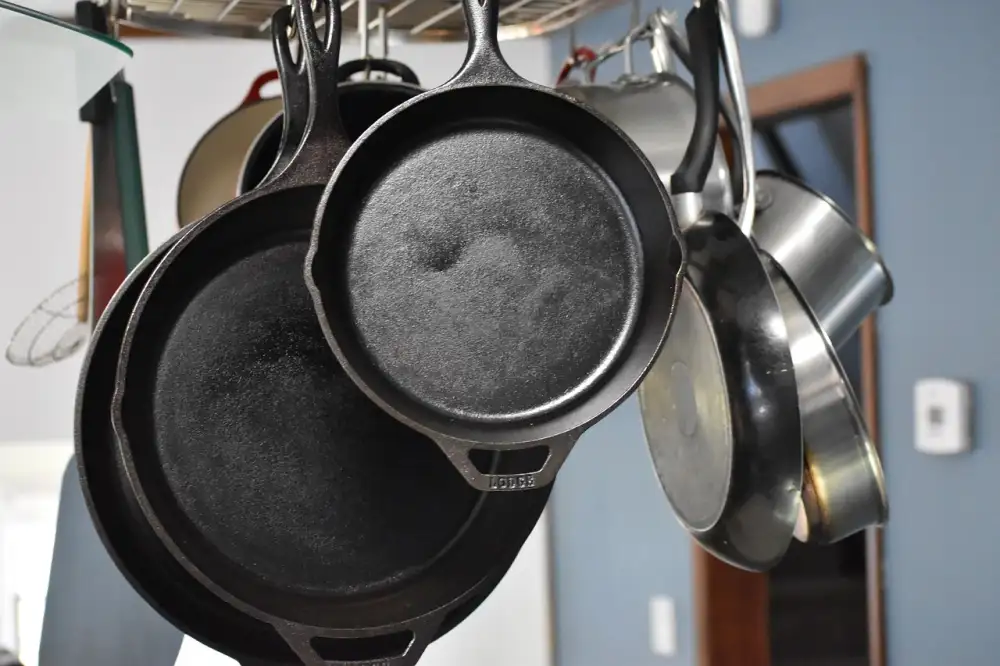Ultimate Guide to Clean Cast Iron Skillet: Expert Tips for a Spotless Kitchen Essential

- Gather materials: coarse salt, paper towels, hot water, mild dish soap.
- Scrub the skillet with coarse salt and paper towels to remove food residue.
- Rinse the skillet with hot water and mild dish soap.
- Dry the skillet thoroughly with a clean towel.
- Apply a thin layer of oil to the skillet to prevent rusting.
- Store the skillet in a dry place to maintain its seasoning.
Gather materials: coarse salt, paper towels, hot water, mild dish soap.
Before you start cleaning your cast iron skillet, make sure you have all the necessary materials on hand. You will need coarse salt, paper towels, hot water, and mild dish soap. These items are essential for effectively removing food residue and maintaining the quality of your skillet. Be sure to gather these materials before beginning the cleaning process to ensure a spotless kitchen essential.
Scrub the skillet with coarse salt and paper towels to remove food residue.
To effectively clean a cast iron skillet, start by scrubbing it with coarse salt and paper towels to remove any food residue. The coarse salt acts as a gentle abrasive that helps loosen stuck-on bits of food without damaging the skillet's seasoning. Simply sprinkle a generous amount of coarse salt onto the skillet's surface and use a folded paper towel to scrub in circular motions. Be sure to apply some pressure while scrubbing to lift off any stubborn residue. This method is a natural and chemical-free way to clean your cast iron skillet without the risk of removing its valuable seasoning.
Rinse the skillet with hot water and mild dish soap.
After scrubbing the skillet with coarse salt and paper towels to remove any food residue, it's time to give it a thorough rinse. Rinse the cast iron skillet under hot running water, making sure to remove all traces of salt and loosened food particles. Next, add a small amount of mild dish soap to the skillet and gently scrub with a soft sponge or brush. The soap will help to remove any remaining grease or stubborn stains without damaging the skillet's seasoning. Be sure to rinse the skillet thoroughly with hot water to ensure all soap residue is removed before drying it completely.
Dry the skillet thoroughly with a clean towel.
After rinsing the skillet with hot water and mild dish soap, it is crucial to dry it thoroughly with a clean towel. Any leftover moisture can lead to rusting, which can damage the skillet over time. Use a dry paper towel or cloth to wipe the skillet inside and out until all moisture is removed. Pay special attention to the handle and any crevices where water may have collected. Properly drying the skillet will help maintain its seasoning and prevent any potential issues with rust in the future.
Apply a thin layer of oil to the skillet to prevent rusting.
After drying the skillet thoroughly, it is crucial to apply a thin layer of oil to prevent rusting. The oil creates a barrier between the iron and moisture in the air, helping to maintain the skillet's seasoning and preventing it from corroding. Use a high smoke-point oil such as vegetable oil or flaxseed oil for this step. Simply apply a small amount of oil to a paper towel and rub it all over the surface of the skillet, including the handle and exterior. Make sure to coat both the inside and outside evenly to protect the entire skillet from rusting.
Store the skillet in a dry place to maintain its seasoning.
To maintain the seasoning of your cast iron skillet, it is essential to store it in a dry place. Excess moisture can lead to rusting and deterioration of the skillet's seasoning. After cleaning and drying the skillet thoroughly, make sure to store it in a cool, dry place away from any sources of moisture. Avoid storing the skillet near the sink or on a damp countertop. You can also place a paper towel inside the skillet when storing to absorb any excess moisture and help keep it dry. By storing your cast iron skillet properly, you can ensure its longevity and cooking performance for years to come.
Published: 08. 04. 2024
Category: Home



